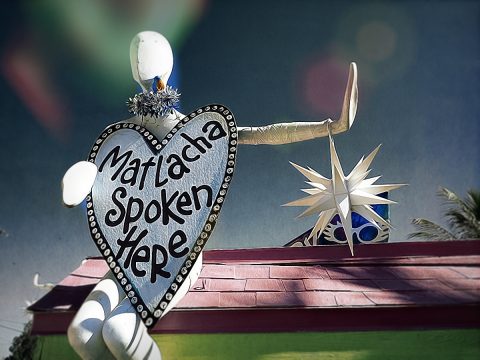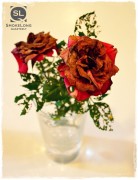One thing I loved about this piece is how you capture timelessness. You seemingly inhabit the ancient, the modern, and the primitive all at once. And to top it off, you play with large cosmic dilemmas and questions. Can you talk about the conception/inspiration for this piece, including the title?
First, thank you for your nice comments. When I write a story or poem I naturally hope there is something in it an astute reader will respond to, and your comment makes me feel as though I may have succeeded at least a bit. The piece actually started off to be more about a life seeming to find its own measurement as it neared death—how death was the logical as well as spiritual transition. At some point it became a piece about what death would be like if I imagined it being more than a vanishing. What would it be like if the notions of heaven and hell or spiritual completion were ignored? If we made our own deaths in a way it’s often said we do our lives, although I have to say I’m not convinced we make our own lives. What if the idea of free will was operational in death in a way I don’t think it is in life? The title came from thinking of the long death that is apparently short to the living. He returns to a world he left, as evidenced by the children and family. Time does not have an inherent essence. That it has become a true expression is a great example of how language shapes our deep ideas and beliefs instead of the other way around.
The story is separated into three sections—“Entry,” “Deadman,” and “Threshold.” During my first read, I approached the story as a whole, imagining the protagonist moving through time and contemplating his life and death. On my second read, I looked at each section as stand-alone pieces linked by theme and the recurring sense of dissatisfaction with what death had to offer. What was your process in constructing this piece?
As I said, it started out as a piece about the ending of a life. Then I sort of suddenly wrote “Threshold” and I had something different on my hands, and I shrugged my shoulders and saved the file and mostly forgot it for a long time. Then I honestly think I ran across it on a flash drive and having recently read Juan Rulfo and being a degenerate imitator, I wrote a new section and a much different version of “Deadman.” So there were four sections for me to noodle with off and on for a couple more years between other things. When I finally had it to a place where I thought there was something worthwhile for someone besides me, I sent it out. It was Tara here at SmokeLong who suggested I cut the opening section, which was exactly right. Now there is a piece about an imagined death without the distraction of another depressed guy’s life.
Much of your work that I’ve been able to access online shares a kind of narrative distance. Do stylistic/formal leanings inform how your stories will be told, or does the story determine the form? Some years ago, you published another story here at SmokeLong, and it was markedly different from this one. Can you talk about how your writing has changed since that time?
This question makes me realize that there is a difference between my poetry and prose that I’d never realized. I guess I still think of myself more as a poet than as a writer of fiction, which may be perverse because my fiction is generally better received, I think. It’s true there is usually a more formal distance in my fiction/prose. I’m now writing what seems to be turning into a series of poems that are in a distinctive voice, a narration almost. I can’t think of a successful story that is done that way. The story I had here at SmokeLong years ago was in more of a self-conscious voice, now that I think of it. Truthfully, that story is probably one I’d write as a poem today. I think that more clearly defined demarcation is something that has changed. As you may be able to determine already, I’m not capable of much planning in my work. That’s why I doubt I’ll ever write a novel, which was my goal for so many years.
What writers or stories do you think helped inform this particular story? What writers/stories are you excited about now?
I’ve already mentioned Juan Rulfo. I didn’t read him well into writing this, but I think the emptiness of the death sequences here owe something to him—not in an imitative way so much, I hope, but in how he makes the so-called Mexican death culture happen before the reader’s eyes in a way that, say, Malcolm Lowry wasn’t able to do. At one point in my life I enjoyed reading Gilgamesh and other ancient stories, and perhaps there is some deep memory of that here as well.
As to current reading, I have been one of millions in the Robert Walser fan club for some time. I’ve recently read Bae Suah and am stunned by her voice. There may be a little similarity to this piece in that regard although that is the ultimate in vanity. Clarice Lispector, of course, and Stig Saeterbakken are just a few writers of prose. So many. The poetry is maybe even more scattered. Stern; Alejandra Pizarnik, recently, in translation; Frank Stanford; always Elizabeth Bishop; and so many others. And Tolstoy, Chekhov. Those are the two mainstays of my reading life and will be until I die. I realize there are no contemporary writers listed but there are several. Mia Avramut and Rose Hunter are two gifted poets I know and support. Sherry O’Keefe. Robert Vaughan. Your own Tara Laskowski and Christopher Allen. Kathy Fish. Meg Tuite and Meg Pokrass, Joani Reese, Susan Tepper, so many people I have probably insulted now. Forgive me. I have holes in my brain.
Can you tell us about any current writing projects?
My writing goes where it goes. It’s a weakness. As mentioned, I seem to be writing a series of poems that have a similar voice. I’m not as young as I was, so I try to shape things less. Also, my health wasn’t good for few years, and that altered how I approached my life and work. I only do what I find necessary to do. If it isn’t pressing, I don’t do it. So, with an attitude like that, who knows what may happen?



 In September 2022 SmokeLong launched a workshop environment/community christened SmokeLong Fitness. This community workshop is happening right now on our dedicated workshop site. If you choose to join us, you will work in a small group of around 15-20 participants to give and receive feedback on flash narratives—one new writing task each week.
In September 2022 SmokeLong launched a workshop environment/community christened SmokeLong Fitness. This community workshop is happening right now on our dedicated workshop site. If you choose to join us, you will work in a small group of around 15-20 participants to give and receive feedback on flash narratives—one new writing task each week.